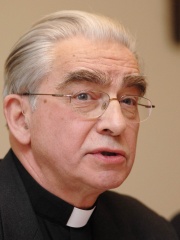

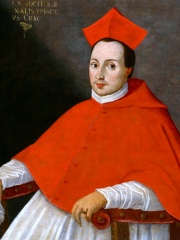
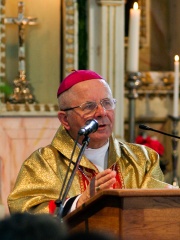
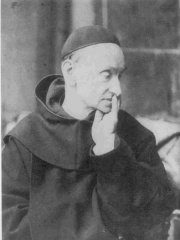
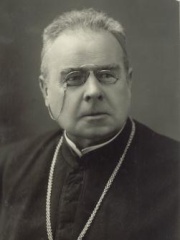
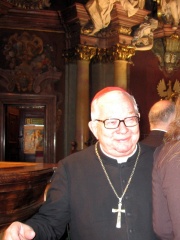
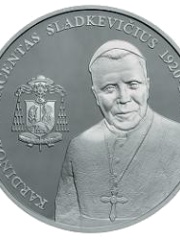
The Most Famous
RELIGIOUS FIGURES from Lithuania
This page contains a list of the greatest Lithuanian Religious Figures. The pantheon dataset contains 3,187 Religious Figures, 11 of which were born in Lithuania. This makes Lithuania the birth place of the 40th most number of Religious Figures behind Romania, and Bulgaria.
Top 10
The following people are considered by Pantheon to be the top 10 most legendary Lithuanian Religious Figures of all time. This list of famous Lithuanian Religious Figures is sorted by HPI (Historical Popularity Index), a metric that aggregates information on a biography's online popularity. Visit the rankings page to view the entire list of Lithuanian Religious Figures.

1. Audrys Bačkis (b. 1937)
With an HPI of 63.35, Audrys Bačkis is the most famous Lithuanian Religious Figure. His biography has been translated into 28 different languages on wikipedia.
Audrys Juozas Bačkis (Lithuanian: [ɐʊˈdʲrʲiːs ˈjuɔzɐs ˈbaːtɕkʲɪs]; born 1 February 1937) is a Lithuanian prelate of the Catholic Church and a cardinal since 2001. He worked in the diplomatic service of the Holy See from 1964 to 1991, when he became Archbishop of Vilnius. He retired in 2013.

2. Elazar Shach (1898 - 2001)
With an HPI of 62.76, Elazar Shach is the 2nd most famous Lithuanian Religious Figure. His biography has been translated into 38 different languages.
Elazar Menachem Man Shach (Hebrew: אלעזר מנחם מן שך, Elazar Shach; January 1, 1899 O.S. – November 2, 2001) was a Haredi rabbi who headed Lithuanian Orthodox Jews in Israel and around the world from the early 1970s until his death in 2001. He served as chair of the Council of Sages and one of three co-deans of the Ponevezh Yeshiva in Bnei Brak, along with Shmuel Rozovsky and Dovid Povarsky. Due to his differences with the Hasidic leadership of the Agudat Yisrael political party, he allied with Ovadia Yosef, with whom he founded the Shas party in 1984. Later, in 1988, Shach criticized Ovadia Yosef, saying that, "Sepharadim are not suitable for leadership positions", and subsequently founded the Degel HaTorah political party representing the Litvaks in the Israeli Knesset.

3. Jerzy Radziwiłł (1556 - 1600)
With an HPI of 62.17, Jerzy Radziwiłł is the 3rd most famous Lithuanian Religious Figure. His biography has been translated into 19 different languages.
Prince Jerzy Radziwiłł (Lithuanian: Jurgis Radvila; 31 May 1556 – 21 January 1600) was a Polish–Lithuanian magnate and Imperial Reichsfürst from the Radziwiłł family. He was ordained a Catholic priest and later rose through the ranks as Bishop of Vilnius eventually becoming a cardinal. He was a close friend and adviser of King Sigismund III and represented his interests in front of the Pope. Raised a Calvinist, Radziwiłł was educated at the University of Leipzig. In 1572 he converted to Catholicism and became associated with the Jesuits. He continued to study at Jesuit colleges in Poznań, Vilnius, and Rome. Radziwiłł began his duties as Bishop of Vilnius in 1579. He established Vilnius Seminary in the family palace (called Kardynalia Palace after him) and helped to obtain university status for the Jesuit Academy in Vilnius. He was ordained to the priesthood (10 April 1583) and was not consecrated bishop until 26 December 1583. He was elevated to the cardinalate by Pope Gregory XIII only on 12 December 1583 and was assigned the titulus of S. Sisto on 14 July 1586. He did not participate in the 1585 papal conclave, which elected Pope Sixtus V; or the September 1590 papal conclave, which elected Pope Urban VII; or the October–December 1590 papal conclave, which elected Pope Gregory XIV. In 1591, he became Bishop of Kraków. He did participate in the 1591 papal conclave, which elected Pope Innocent IX; and in the 1592 papal conclave, which elected Pope Clement VIII. Radziwiłł was also involved in political life. He served as deputy administrator (namiestnik) of Polish Livonia (Inflanty) from 1582 until 1585. He participated in the 1587 election of King Sigismund III Vasa and became his trusted adviser. Radziwiłł supported the Third Statute of Lithuania (1588) and the Union of Brest (1596). He came to Rome to participate in the Jubilee of 1600, but died in Rome on 21 January and was buried in the Church of the Gesu.

4. Sigitas Tamkevičius (b. 1938)
With an HPI of 60.50, Sigitas Tamkevičius is the 4th most famous Lithuanian Religious Figure. His biography has been translated into 22 different languages.
Sigitas Tamkevičius (born 7 November 1938) is a Lithuanian prelate and Cardinal of the Roman Catholic Church and Archbishop emeritus of Kaunas. Pope Francis raised him to the rank of cardinal on 5 October 2019.
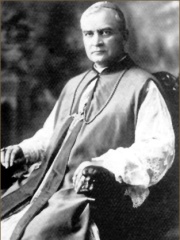
5. Jurgis Matulaitis-Matulevičius (1871 - 1927)
With an HPI of 59.56, Jurgis Matulaitis-Matulevičius is the 5th most famous Lithuanian Religious Figure. His biography has been translated into 18 different languages.
Jurgis Matulaitis-Matulevičius (Polish: Jerzy Bolesław Matulewicz-Matulaitis; 13 April 1871 - 27 January 1927) was a Latin Church Catholic prelate who served as the Bishop of Vilnius from late 1918 until his resignation in 1925. Matulaitis was also the founder of the Sisters of the Immaculate Conception and the Handmaids of Jesus in the Eucharist; he served as the Superior-General of the Marian Fathers from 1911 until his death. He worked in secret to revive the Marian Fathers after the Russian authorities suppressed all religious orders and he even relinquished his teaching position to better dedicate himself to that secret revival. He was a noted teacher and spiritual director who set up other branches of the order in places such as Switzerland and the United States far from Russian authorities. Matulaitis' cause for sainthood opened in the 1950s before he was titled as Venerable in 1982. Pope John Paul II beatified the late bishop on 28 June 1987 in Saint Peter's Basilica and referred to the bishop as a "man of God's heart".

6. Raphael Kalinowski (1835 - 1907)
With an HPI of 59.48, Raphael Kalinowski is the 6th most famous Lithuanian Religious Figure. His biography has been translated into 17 different languages.
Raphael of Saint Joseph Kalinowski (1 September 1835 – 15 November 1907) was a Polish Carmelite, social activist, participant in the January Uprising, and a saint of the Catholic Church. Before his conversion, he served in the Imperial Russian Army, fought in the January Uprising in Lithuania and was exiled to Siberia. He was born as Józef Kalinowski in Vilnius into a noble family bearing the Kalinowa coat of arms. After completing his education at the Institute for Nobles in Vilnius, he became a military engineer in the Russian army, where he engaged in pro-independence conspiracy. After the outbreak of the January Uprising, he left the army; he did not take part in the fighting himself, but supported the insurgents. For this activity, in 1864 he was sentenced to death, later commuted to ten years of hard labor in Siberia. During his exile he underwent a religious conversion and became a devout Catholic. After returning in 1874, he settled in Warsaw. In 1877 he entered the Carmelite novitiate in Graz, taking the religious name Raphael of Saint Joseph Kalinowski. He professed his solemn vows in 1881 and settled in the monastery in Czerna near Kraków, where he soon became prior. He gained renown as a confessor, theologian, translator, and founder of monastic houses. He died on 15 November 1907 in the odour of sanctity. His informative process was opened in 1934. On 22 June 1983 in Kraków, John Paul II beatified Raphael Kalinowski, and on 17 November 1991 in Rome, canonized him. The liturgical memorial of St. Raphael Kalinowski is celebrated on 20 November. He is the patron saint of Catholics in Siberia, as well as soldiers, engineers, and railway workers.

7. Maironis (1862 - 1932)
With an HPI of 57.90, Maironis is the 7th most famous Lithuanian Religious Figure. His biography has been translated into 23 different languages.
Maironis (born Jonas Mačiulis, Lithuanian: Jonas Mačiulis, Polish: Jan Maculewicz; 2 November [O.S. 21 October] 1862 – 28 June 1932) was a Lithuanian Roman Catholic priest and the greatest and most-known Lithuanian poet, especially of the period of the Lithuanian press ban. He was called the Bard of Lithuanian National Revival (Tautinio atgimimo dainius). Maironis was active in public life. However, the Lithuanian literary historian Juozas Brazaitis writes that Maironis was not. In his poetry, he expressed the national aspirations of the Lithuanian National Revival and was highly influential in Lithuanian society and poetry. The Maironian school in Lithuanian literature was named after him.

8. Henryk Gulbinowicz (1923 - 2020)
With an HPI of 57.26, Henryk Gulbinowicz is the 8th most famous Lithuanian Religious Figure. His biography has been translated into 24 different languages.
Henryk Roman Gulbinowicz (17 October 1923 – 16 November 2020) was a prelate of the Catholic Church who served as Archbishop of Wrocław from 1976 to 2004. Pope John Paul II made him a cardinal in 1985. In 2020, he was banned from making public appearances following a Holy See investigation that confirmed allegations that he had committed sexual abuse and evidence that he had been a secret police informant from 1969 to 1985. Following his death, Gulbinowicz was forbidden to have his funeral service at the city’s Cathedral of St. John the Baptist or to be buried in the cathedral.

9. Vincentas Sladkevičius (1920 - 2000)
With an HPI of 55.46, Vincentas Sladkevičius is the 9th most famous Lithuanian Religious Figure. His biography has been translated into 17 different languages.
Vincentas Sladkevičius, M.I.C. (20 August 1920 – 28 May 2000) was a Lithuanian Cardinal of the Roman Catholic Church. He served as Archbishop of Kaunas from 1989 to 1996, and was elevated to the cardinalate in 1988.

10. Ignaty Krachkovsky (1883 - 1951)
With an HPI of 55.10, Ignaty Krachkovsky is the 10th most famous Lithuanian Religious Figure. His biography has been translated into 17 different languages.
Ignaty Yulianovich Krachkovsky (Russian: Игна́тий Юлиа́нович Крачко́вский (4 (16) March 1883, Vilnius — 24 January 1951, Leningrad) was a Russian and Soviet Arabist, academician of the Russian Academy of Science (since 1921; since 1925 Academy of Science of the USSR). Krachkovsky was one of the founders of the Soviet school of Arab studies. Krachkovsky is known for authoring the translation of Quran into Russian. His book of recollections Among Arabic Manuscripts was awarded Stalin Prize (in 1951).
People
Pantheon has 11 people classified as Lithuanian religious figures born between 1556 and 1972. Of these 11, 3 (27.27%) of them are still alive today. The most famous living Lithuanian religious figures include Audrys Bačkis, Sigitas Tamkevičius, and Rolandas Makrickas. The most famous deceased Lithuanian religious figures include Elazar Shach, Jerzy Radziwiłł, and Jurgis Matulaitis-Matulevičius. As of April 2024, 1 new Lithuanian religious figures have been added to Pantheon including Rolandas Makrickas.
Living Lithuanian Religious Figures
Go to all RankingsAudrys Bačkis
1937 - Present
HPI: 63.35
Sigitas Tamkevičius
1938 - Present
HPI: 60.50
Rolandas Makrickas
1972 - Present
HPI: 54.75
Deceased Lithuanian Religious Figures
Go to all RankingsElazar Shach
1898 - 2001
HPI: 62.76
Jerzy Radziwiłł
1556 - 1600
HPI: 62.17
Jurgis Matulaitis-Matulevičius
1871 - 1927
HPI: 59.56
Raphael Kalinowski
1835 - 1907
HPI: 59.48
Maironis
1862 - 1932
HPI: 57.90
Henryk Gulbinowicz
1923 - 2020
HPI: 57.26
Vincentas Sladkevičius
1920 - 2000
HPI: 55.46
Ignaty Krachkovsky
1883 - 1951
HPI: 55.10
Newly Added Lithuanian Religious Figures (2025)
Go to all RankingsOverlapping Lives
Which Religious Figures were alive at the same time? This visualization shows the lifespans of the 7 most globally memorable Religious Figures since 1700.


